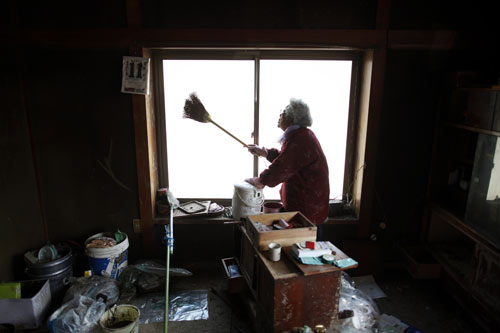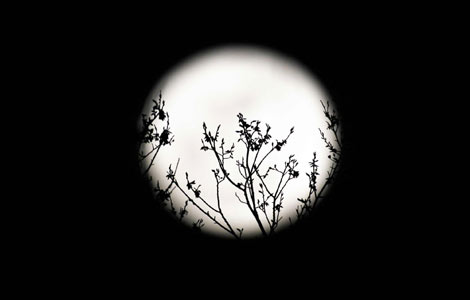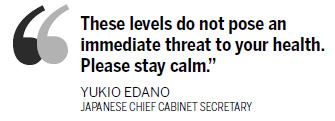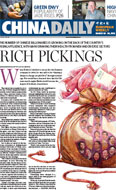Asia
Radiation cited in milk, spinach near Japan's nuclear sites
Updated: 2011-03-21 08:04
By Mark Mcdonald and Ayasa Aizawa (China Daily)
|
 A calendar shows the date of the massive earthquake as 86-year-old Teru Suzuki cleans her damaged home in Ofunato on Sunday. Damir Sagolj / Reuters |
|
|
TOKYO - As Japan edged forward in its battle to contain the damage at its ravaged nuclear power plants on Saturday, the government said it had found higher than normal levels of radioactivity in spinach and milk at farms up to 145 km away from the plants, the first confirmation that the unfolding nuclear crisis has affected the nation's food supply.
While officials played down the immediate risks to consumers, the findings further unsettled a nation worried about the long-term effects of the damaged nuclear power plants.
The Tokyo Electric Power Co, with help from the Japan Self-Defense Forces, police officers and firefighters, continued efforts to cool the damaged reactors to try to stave off a further fuel meltdown and stem the radiation leak. About 500 workers from the utility connected the power line. The apparent progress offered a glimmer of hope after days of increasingly dire news that now includes contaminated food.
Yukio Edano, the chief Cabinet secretary, said that spinach and milk were the only products found with abnormally high levels of radioactive materials. The level of radioactivity found in the spinach would, if consumed for a entire year would amount to just a fraction of a CAT scan.
"These levels do not pose an immediate threat to your health," Edano said. "Please stay calm."
Still, Fukushima prefecture asked all dairy farms within 29 km of the nuclear plant on Saturday to halt all milk shipments. Officials also halted shipments of spinach from the entire prefecture.
The milk with the elevated radiation levels was found in Fukushima prefecture on farms about 31 km from the nuclear plants. The contaminated spinach was found one prefecture to the south, in Ibaraki prefecture, on farms 97 km to 145 km from the plants.
Food safety inspectors said the amount of iodine-131 found in the tested milk was five times higher than levels deemed safe. They said the iodine found in the spinach was more than seven times higher. The spinach also contained slightly higher amounts of cesium-137.
Minuscule amounts of radioactive iodine were also detected in the water supply in Tokyo and its five surrounding prefectures. In Tokyo, about 240 km from the Fukushima Daiichi plant, the level was less than 1 percent of that considered dangerous by the government.
Iodine-131 and cesium-137 are two of the most dangerous elements that are feared to have been released from the plants in Fukushima. Iodine-131 can be dangerous to human health, especially if absorbed through milk and milk products, because it can accumulate in the thyroid and cause cancer. Cesium-137 can damage cells and lead to an increased risk of cancer.
The iodine levels are well beyond what the Food and Drug Administration in the United States considers a cause for concern. But experts say Japan's reassurances about food safety were probably accurate.
Harold M. Swartz, a professor of medicine at Dartmouth who studies radiation exposure in people, said that the contamination levels were low and that the government's advice was "probably reasonable." But, he added, because people are so afraid of radiation, they are likely to avoid these foods altogether.
A handful of vegetable-shop owners in Tokyo said they were concerned about the report, but continued to sell vegetables from Fukushima and Ibaraki because they had not been told to stop.
Swartz said the radiation levels detected so far were still far lower than those at Chernobyl, the nuclear plant that exploded in Ukraine in 1986 and is still the world's worst nuclear accident.
The Japanese government is considering conducting more comprehensive tests of agricultural products from areas farther from the damaged reactors to address public anxiety, Edano said.
Health inspectors are still trying to determine whether any spinach had been shipped from the six farms in Ibaraki prefecture where the contaminated produce was found, said Taku Ohara, an official in the food safety division of the Health, Labor and Welfare Ministry.
No contaminated milk had been shipped from the farm where higher than normal radioactive levels were detected.
Meanwhile, reports from Taiwan said radiation was detected on fava beans imported from Japan.
Taiwan's Atomic Energy Council Radiation Monitoring Center said that a small amount of iodine and cesium had been found on a batch of Japanese fava beans imported to the island on Friday.
The amount of radiation was well below legal limit and not harmful to human health, an official from the center said on condition of anonymity.
New York Times
E-paper

City of Joy
Welcome to the 'world of smiles' where life meanders slowly.
Debate on nuclear power revived
The future is now
Common approach
Specials

Beloved polar bear died
Berlin's beloved polar bear Knut, an international star died Saturday.

Panic buying of salt
Worried Chinese shoppers stripped stores of salt on radiation fears.

'Super moon'
The "Super Moon" arrives at its closest point to the Earth in 2011.

